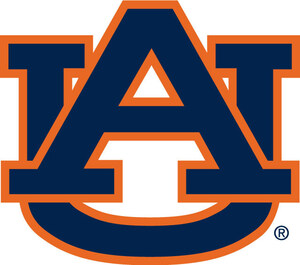AUBURN, Ala., Nov. 1, 2022 /PRNewswire/ -- Millions of them are everywhere, but you may not see them: on clothes you buy, on food ingredient packaging and even on the football field. Initially designed to move products through supply chains, their use is expanding exponentially.
What are they? RFID tags, which are small, paper-thin tags with an electromagnetic chip that gives an item its own serial number identity for detection up to several yards away. RFID—an abbreviation for radio-frequency identification— uses radio waves to identify products or any objects that have a tag.
"Data from large quantities of products or items can be summarized all at once, recording literally hundreds of items in just seconds," said Justin Patton, director of Auburn University's RFID Lab.
The lab is an internationally renowned research institute focusing on RFID and other emerging technologies, with faculty and students from Auburn's Raymond J. Harbert College of Business, the Samuel Ginn College of Engineering and the College of Human Sciences.
"A retail employee can use an RFID scanner by simply walking along an aisle and waving the scan gun up and down the shelves," Patton said. "Everything within the scan gun's range, or wave, will be recorded by the scanner. We can inventory hundreds of items per second."
Auburn is collaborating with major retailers on tracking products through the supply chains, as well as working with restaurant chains in tracking the freshness of ingredients by placing tags on the packaging.
"An example of how RFID technology improves sales service is how product availability affects the overall customer experience," Patton said. "The improved data and accountability with the RFID system helps eliminate such issues and make it easier and faster to find merchandise, especially in cases where numerous products might be stored in a crowded storage area and to easily know the dates when items go through the supply chain."
And it's not just faculty making an impact.
"We have approximately 100 Auburn students working in the lab and gaining valuable experience prior to entering the workforce," Patton said. "We have students conducting high-level research, and their projects are being immediately implemented in several Fortune 500 companies."
Students also help with commencement exercises, where new graduates' names are displayed on the videoboard. RFID tags are placed on name cards and scanned when graduates walk across the stage, thus it's guaranteed the correct name is behind the students as they cross in front of the videoboard.
On gamedays in Jordan-Hare Stadium, students have helped screen access to the field by using RFID guns to scan passes of those who have permission to be on the sidelines. The RFID Lab also helps Auburn Athletics do an inventory of RFID-tagged gear and clothing.
"We have tags on the players' equipment to help the equipment managers know how long pads have been used, or to keep track of all the gear that must be cleaned after each game or practice," Patton said.
Millions of the RFID tags are helping everywhere … thanks to Auburn's RFID Lab and its research.
SOURCE Auburn University

WANT YOUR COMPANY'S NEWS FEATURED ON PRNEWSWIRE.COM?
Newsrooms &
Influencers
Digital Media
Outlets
Journalists
Opted In




Share this article